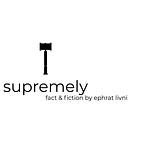The Domain Name Hustle Is About to Get Way More Intense
A recent U.S. Supreme Court ruling that allows companies to trademark generic URLs could change how the web works
Imagine if a brand could monopolize the commonplace word that describes its wares, like if Apple could trademark “computers” and sue competing manufacturers who use the term.
That seems wrong. Right? You might resist this because it unfairly limits competition.
Apple wouldn’t be succeeding based on consumer goodwill, but because the federal government’s Patent and Trademark Office (PTO) granted it a linguistic monopoly. And thanks to this (fictional) mark, the company could increasingly box out other businesses by aggressively policing its intellectual property, sending cease-and-desist letters to brands using the word “computers” until only the most wealthy, established, and tenacious device makers, able to litigate expensive claims, remained in business. That would hurt commerce and consumers, which is why trademark law traditionally prohibited generic marks.
Now, let’s take this generics scenario online. A travel reservation services company seeks to register a trademark for Booking.com, say, a brand name composed of two generic terms, “booking” and “.com.” Arguably, the harm to…
